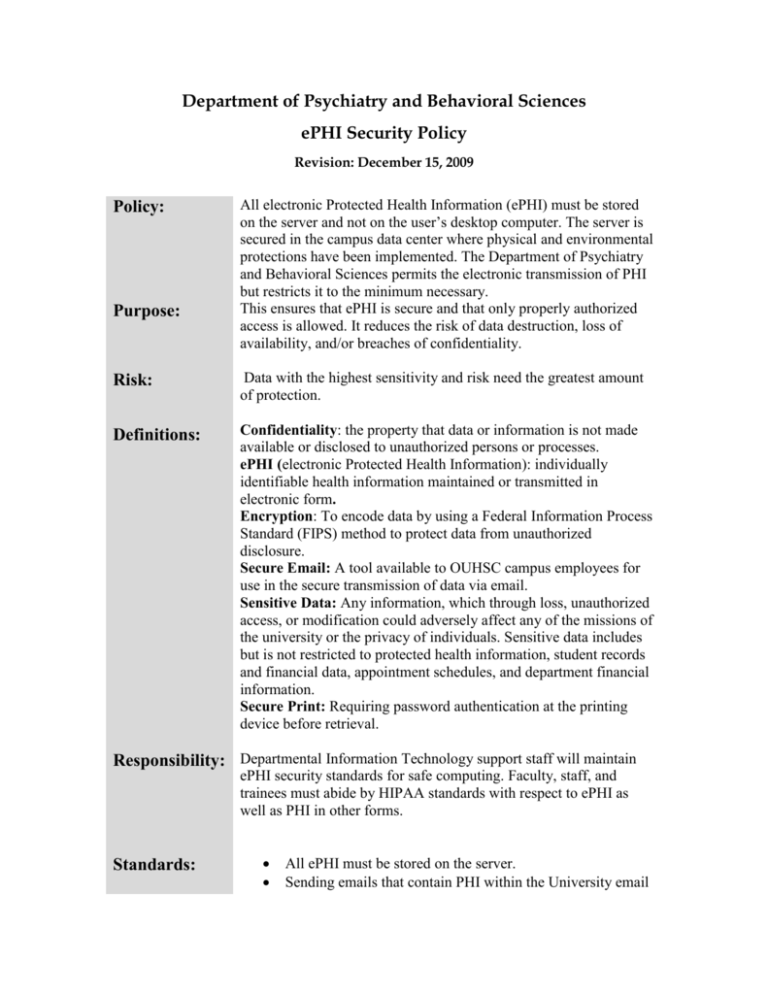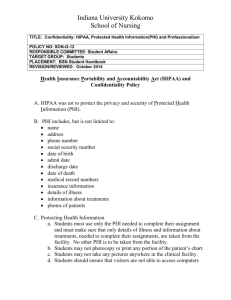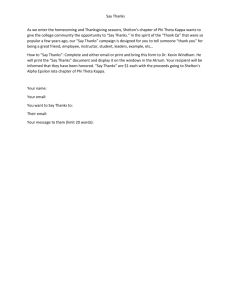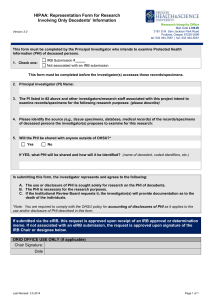Department of Psychiatry and Behavioral Sciences
advertisement

Department of Psychiatry and Behavioral Sciences ePHI Security Policy Revision: December 15, 2009 Policy: Purpose: All electronic Protected Health Information (ePHI) must be stored on the server and not on the user’s desktop computer. The server is secured in the campus data center where physical and environmental protections have been implemented. The Department of Psychiatry and Behavioral Sciences permits the electronic transmission of PHI but restricts it to the minimum necessary. This ensures that ePHI is secure and that only properly authorized access is allowed. It reduces the risk of data destruction, loss of availability, and/or breaches of confidentiality. Risk: Data with the highest sensitivity and risk need the greatest amount of protection. Definitions: Confidentiality: the property that data or information is not made available or disclosed to unauthorized persons or processes. ePHI (electronic Protected Health Information): individually identifiable health information maintained or transmitted in electronic form. Encryption: To encode data by using a Federal Information Process Standard (FIPS) method to protect data from unauthorized disclosure. Secure Email: A tool available to OUHSC campus employees for use in the secure transmission of data via email. Sensitive Data: Any information, which through loss, unauthorized access, or modification could adversely affect any of the missions of the university or the privacy of individuals. Sensitive data includes but is not restricted to protected health information, student records and financial data, appointment schedules, and department financial information. Secure Print: Requiring password authentication at the printing device before retrieval. Responsibility: Departmental Information Technology support staff will maintain ePHI security standards for safe computing. Faculty, staff, and trainees must abide by HIPAA standards with respect to ePHI as well as PHI in other forms. Standards: All ePHI must be stored on the server. Sending emails that contain PHI within the University email system for purposes of treatment, payment, or health care operations is acceptable. Email between OUHSC.edu and HCAHealthcare.com email addresses that contain PHI for treatment, payment, or health care operations is acceptable. PHI must be limited to the minimum necessary. Emails to the VA are not automatically encrypted by OUHSC’s email processes. Emails to the VA with sensitive data should be sent using Secure Email or another secure email service. If emailing information that is from or to a person who has an OUHSC email address the message is encrypted; therefore you will not need to use Secure Email to send messages containing sensitive data to the Norman campus. Except in emergency situations, the use of email to transmit PHI outside the University for treatment, payment, or health care operations is prohibited unless the message is encrypted between sender and recipient. Encryption may be activated by clicking on the “Send Secure” button in Outlook, or typing this in the subject line: [secure]. Those who use this method to send ePHI will be trained in its use by the Department’s information technology support staff. All emails transmitted must contain a confidentiality notice similar to the following: “This email, including any attachments, contains information that may be confidential or privileged. The information is intended to be for the use of the individual or entity named above. If you are not the intended recipient, be aware that any disclosure, copying, distribution, or use of the contents is prohibited. If you have received this email in error, please notify the sender immediately by a “reply to sender only” message and destroy all electronic and hard copies of the communication, including attachments.” If a patient sends an email to a University employee, student, or volunteer asking a health care question or requesting any type of health information that would require a disclosure of PHI, the employee shall decline to respond by sending a message similar to the following: “I [we] have received your health care question or request for health information. However, I [we] cannot respond using email because to do so would require the transmission of information that I [we] consider to be highly sensitive and emails can be intercepted rather easily. I [We] will respond to your question or request through some other means of communication. If you wish to receive health information via email, please submit the Consent for Electronic Communication form attached.” Related Policies: When email encryption is available, employees may send PHI only if the patient has submitted a complete Consent for Electronic Communication form. The email will be included in the patient’s medical record when appropriate. The PHI will be sent, maintained, and accessed in compliance with University HIPAA policies and procedures. Emails that contain patient identifiers and other protected information must be encrypted. When the Department of Psychiatry and Behavioral Sciences begins using OU Physicians’ Centricity Electronic Medical Record (EMR) application, OU Physicians’ Centricity EMR Secure Messaging policy will apply. Secure email will not be utilized for advertising and marketing, release of personal health information or medical records, recruiting of patients, or dismissal of patients. All patient/physician communications sent via secure email should be included in the patient medical record. Secure messages expire in 14 days. Once expired, the Secure Email tool will notify the sender that the message has not been retrieved, and will give an option to manually resend. Documentation in the chart will be retained to show the message was not retrieved. No PHI may be included in the subject line of a message. Magnetic media such as hard drives, recording tapes, and diskettes containing PHI shall be overwritten or reformatted pursuant to the University Electronic Data Disposal and Reuse Policy. PHI should not be stored on portable computing devices unless absolutely necessary. If PHI is stored on a portable computing device, it is to be password protected and the data are to be encrypted. See Portable Computing Device policy. End user responsibilities include placing the monitor in such a way that others cannot see the content on the monitor or the user must use a privacy screen. End users are responsible for locking their personal computers when away from their desks. If documents containing PHI or other sensitive data are sent to a shared printer/copier or printer/copier located in a common area, users must use Secure Print (requiring password authentication at the printing device before retrieval). Information Technology’s related policies may be accessed through http://it.ouhsc.edu/policies. Additional information on HIPAA policies may be accessed through http://www.ouhsc.edu/hipaa/. OU Physicians’ Centricity EMR Secure Messaging policy will be made available during implementation of EMR in the Department. Policy Authority/ Enforcement: The Chairman and departmental business administrator of the Department of Psychiatry and Behavioral Sciences will periodically assess departmental compliance. PHI_Policy10-06_Final_121509







